Editor's note: This is the 56th article in the COVID-19 Global Roundup series. Here is the previous one.
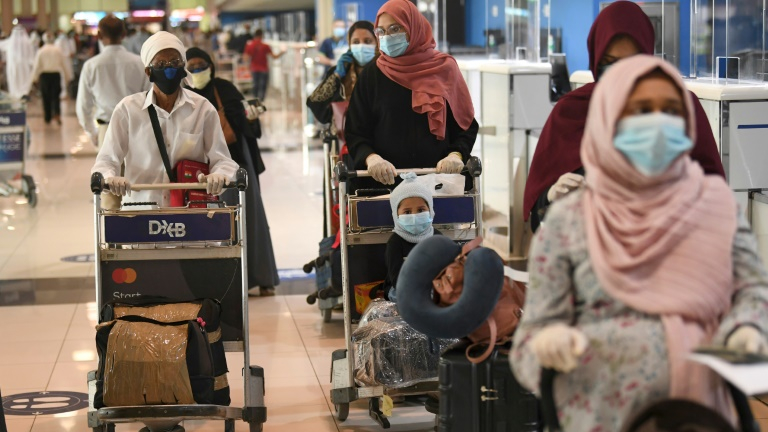
Indian nationals gather at the Dubai International Airport before leaving the country on a flight back to their country, May 7, 2020. /AFP
Indian nationals gather at the Dubai International Airport before leaving the country on a flight back to their country, May 7, 2020. /AFP
Hundreds of thousands expatriate workers from Gulf states are bearing the brunt of job losses and millions fear being stuck in a virus limbo as host countries lock down, employers withhold wages or mull redundancies and strict coronavirus containment measures are enforced.
Experts say Gulf countries will see a large outflow of expatriate workers as a result of the economic shock delivered by the coronavirus pandemic.
According to the International Labor Organization (ILO), the expatriate exodus is expected to be larger than after the 2008-2009 financial crisis and the 2014-2015 plunge in prices for oil. The official data of Oman show the number of expatriates dropped by over 340,000 in 2010, following the 2008-2009 crisis.
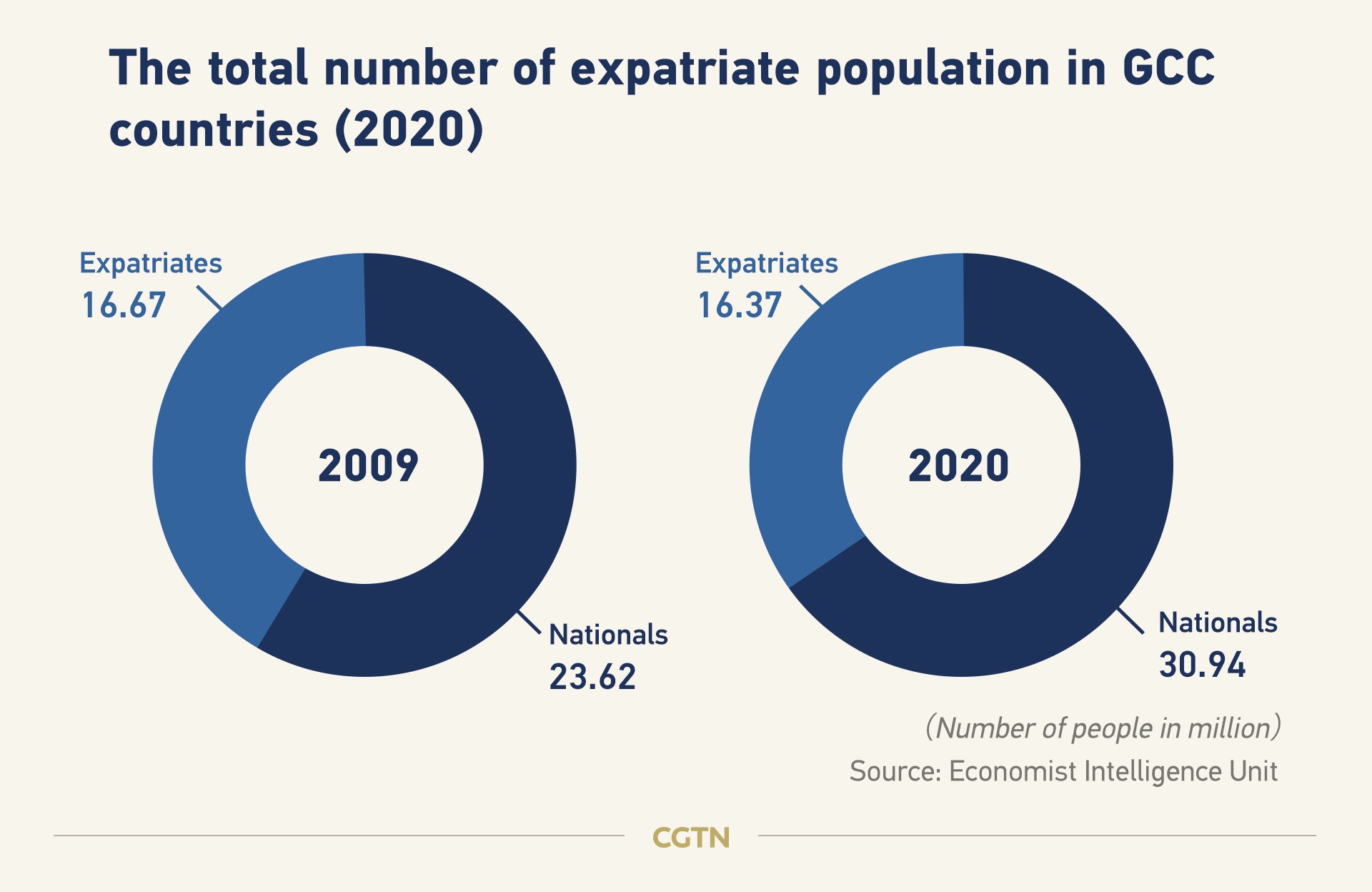
GCC countries are United Arab Emirates, Qatar, Kuwait, Bahrain, Oman and Saudi Arabia. Yin Yating/CGTN
GCC countries are United Arab Emirates, Qatar, Kuwait, Bahrain, Oman and Saudi Arabia. Yin Yating/CGTN
Before the outbreak of the new coronavirus, the world economy had been bracing itself for a recession. Now oil prices are historically low with no demands and thousands of tankers are all filled up with nowhere to go in the Gulf region. Economists predict the economic situation during the pandemic will be worse than the Great Depression during which unemployment and poverty will be at its peak.
To top it all, the sound of local nationals calling for companies to lay foreigners off rather than local employees are becoming louder. A popular Saudi talk show host criticized Saudi businesses retaining expatriates as "having no shame and knowing nothing about loyalty to the country." He called for replacing foreign labor with more skilled Saudis.
Gulf states rely heavily on foreign workers across all sectors of the economy, from professionals to skilled workers and manual labor. Foreigners constitute almost 90 percent of the population in the UAE, two-thirds in Kuwait, half in Oman and Bahrain, and one third in Saudi Arabia.
The major group of migrant workers are from Asian countries, including India, Pakistan, Bangladesh and the Philippines.
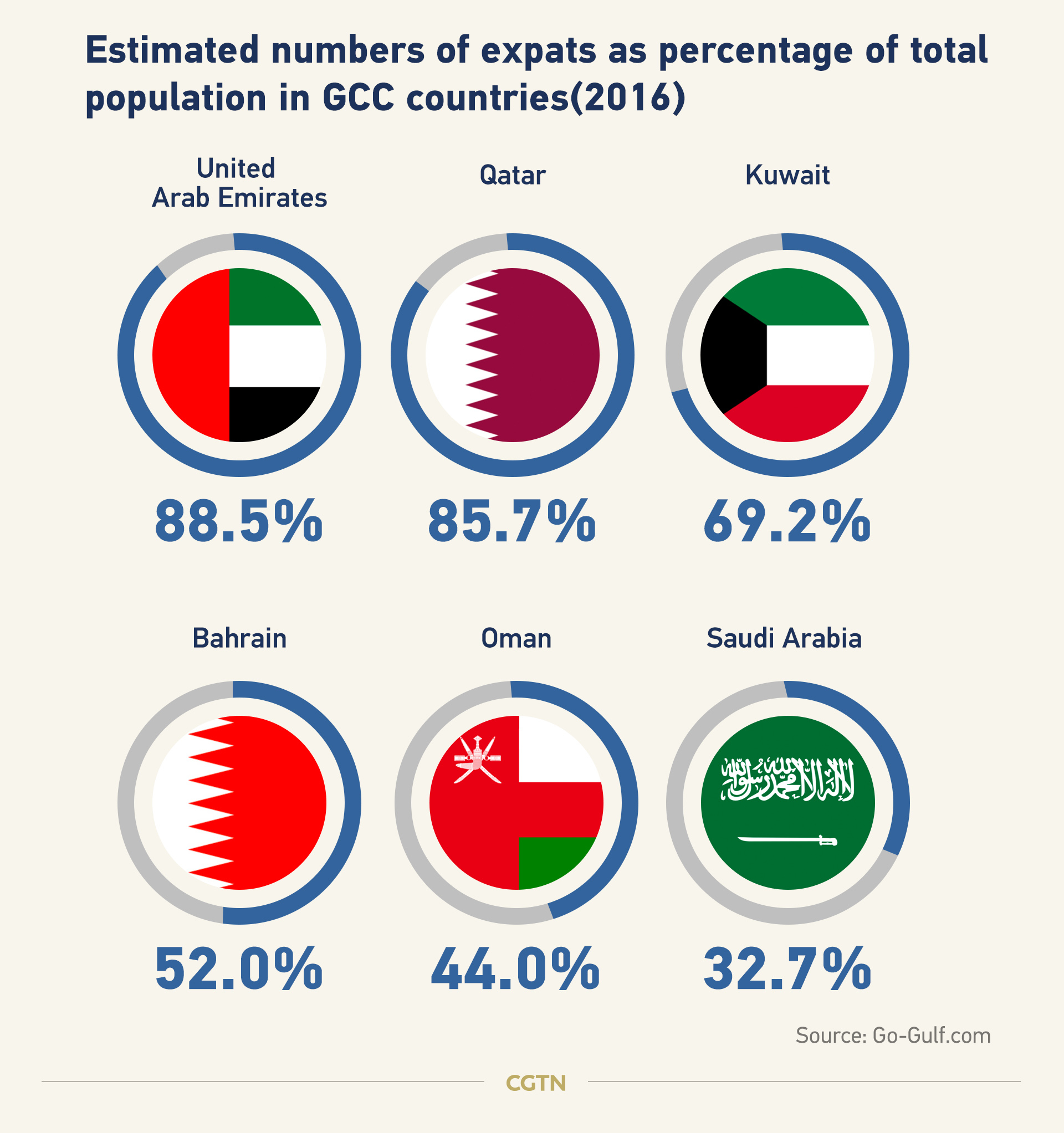
Estimated numbers of expats as percentage of total population in GCC countries in 2016. Yin Yating/CGTN
Estimated numbers of expats as percentage of total population in GCC countries in 2016. Yin Yating/CGTN
Expatriates in limbo
Some laborers in Saudi Arabia, home to 10 million expat workers, complained they were required by bosses to work while Saudis were permitted paid quarantine leave.
Kuwait is considering the possibility of imposing a lockdown on a number of residential areas dominated by expats amid a rise in the number of expatriate coronavirus cases and calls by MPs to isolate those area.
In Qatar, tens of thousands of workers are confined to Doha's Industrial Area after dozens in the blue-collar district tested positive for the COVID-19 virus.
Farman, one of 60,000 Pakistanis registered to leave the UAE, lost his job as a school bus driver two months ago after education centers closed under virus containment measures.
"I want to go home because what's the point of staying without work?" he said, standing in a dimly lit street in front of communal housing in Dubai's Al Quoz industrial area.
And it is not only blue-collar workers who are caught up in the coronavirus squeeze. Many qualified professionals have not been spared.
Samer, a Lebanese-Canadian working at an advertising agency in Saudi Arabia, has been put on six-month unpaid leave and is considering moving to Canada if things do not improve.
"It is very confusing and worrying when you suddenly cannot plan for your future," he said.
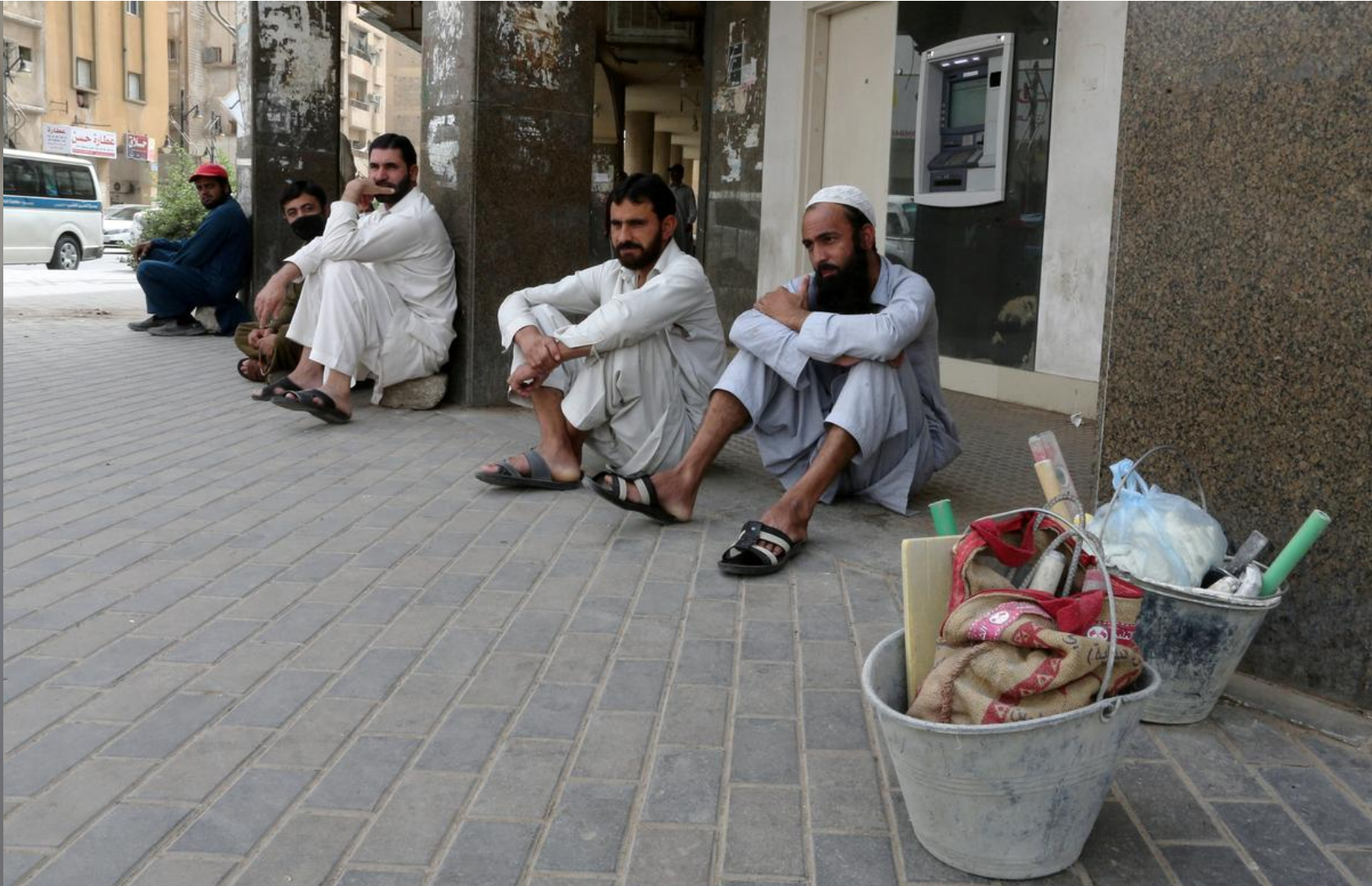
Foreign workers sit on the street after losing their jobs following the outbreak of COVID-19, Riyadh, Saudi Arabia, May 7, 2020. /Reuters
Foreign workers sit on the street after losing their jobs following the outbreak of COVID-19, Riyadh, Saudi Arabia, May 7, 2020. /Reuters
So far, hundreds of thousands of migrants, mostly Asians, have registered for repatriation in the region, which has seen COVID-19 spread among low-income foreign workers in overcrowded living quarters.
Pakistan and India have started evacuating citizens from the Gulf. Egypt has begun repatriation flights from Kuwait. Before that, The United Arab Emirates which has the largest expatriate population has warned labor source countries to take back their citizens. If not, the country will consider to impose strict quotas on work visas issued to nationals of those states.
The first wave of a massive exercise to repatriate hundreds of thousands of Indians stuck abroad began Thursday, with two flights landing in India from the UAE and two warships steaming to the Maldives and the UAE.
Panicked Indians who constitute over 30 percent of the expatriate workforce in this region crashed the website of the civil aviation ministry's website on Wednesday as they rushed to register for repatriation. Some 15,000 nationals will be repatriated from 12 countries on planes and naval ships, while the consulate in Dubai said it had received almost 200,000 applications.
Some evacuees complained they will have to pay for their passage. A 50-year-old restaurant manager who is now out of a job in Qatar told AFP that many have lost their jobs and they don't have money to pay for flights, sincerely hoping the government can waive that.
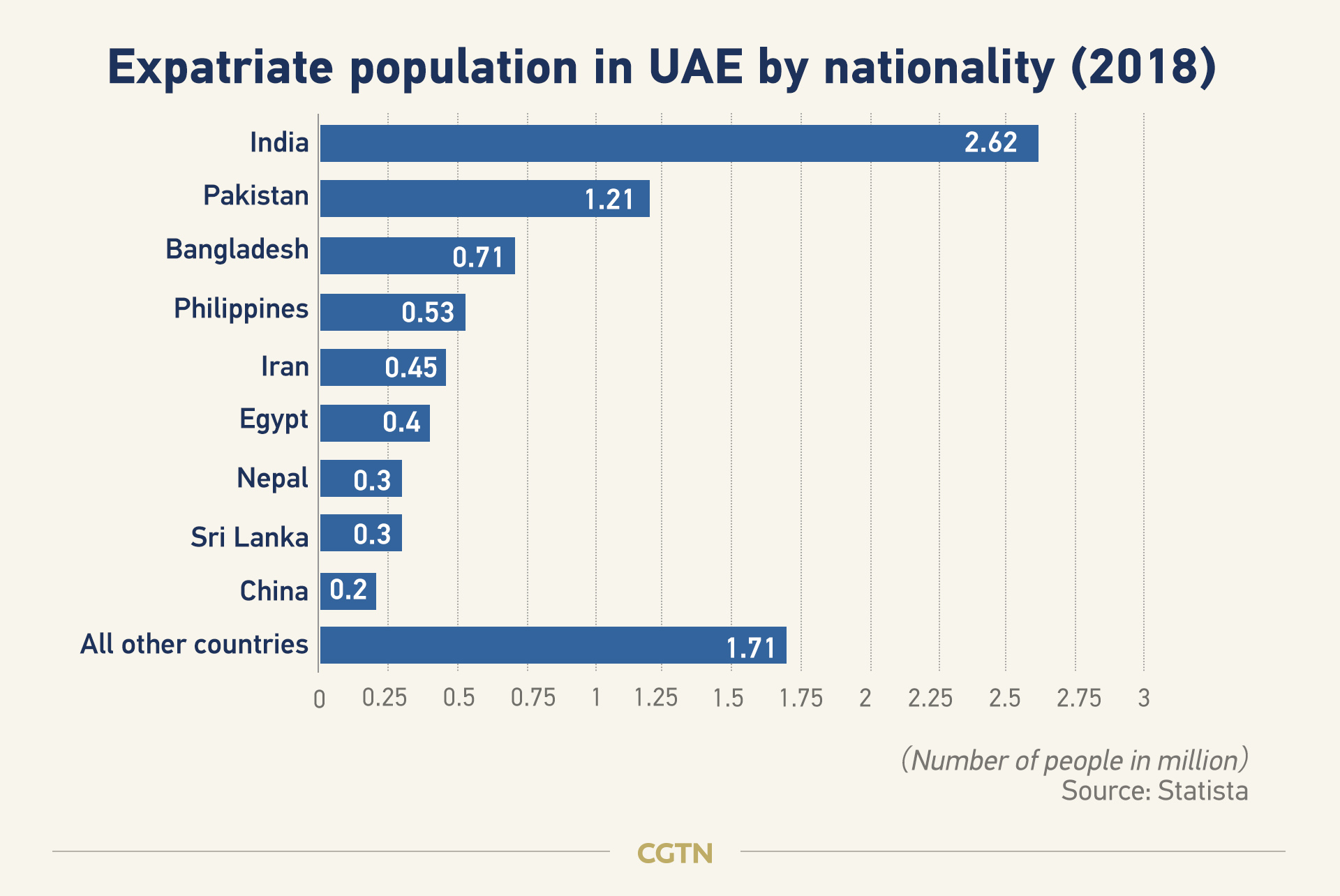
Expatriate population in UAE by nationality in 2018. Yin Yating/CGTN
Expatriate population in UAE by nationality in 2018. Yin Yating/CGTN
Expatriates outflow may not cause shortage of laborers in GCC countries
Though all Gulf countries are trying to reduce their dependence on oil and expatriate laborers, and have begun to invest in training their national labor forces to take on larger roles in the economy, and not just in the public sector, experts say it will not happen in the short term and traditional source markets will continue to dominate as the private sector remains heavily dependent on expatriate laborers.
At the same time, countries like India and Pakistan will also take measures to guarantee improve working conditions for their expatriates in GCC countries, because the region is one of the largest sources of foreign remittances for them.
More than 78 billion dollars was sent from the Gulf region to India in 2018. And out of the 30 million foreigners working in the Gulf, eight million of them are Indians.
"India has a labor force of over 400 million and every year it needs to generate 12 million jobs, which is not possible by any standard. So, sending labor abroad would be one of its major policies," said Zakir Hussein of India's Institute for Defense Studies and Analyses, a foreign relations think tank based in New Delhi.
However, some experts say the coronavirus triggered outflow will add urgency to the nationalization policies.
"A mass exit of foreign workers – if it happens – cannot be completely addressed with local labor force just simply due to numbers, but also technical expertise in different areas, but in the long run, a pandemic such as this will certainly shape future labor policies in the region," George Naufal, a research in Public Policy Research Institute of Texas A&M University said in an interview with Al Arabiya.
( With input from agencies )